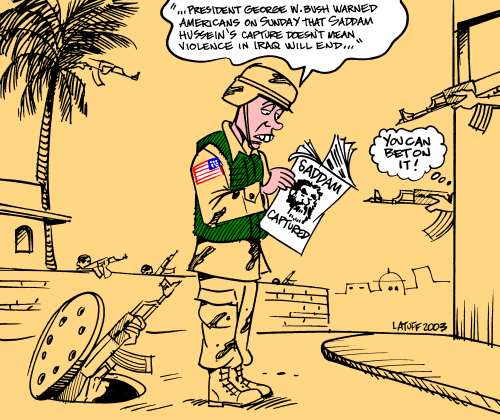|
Resistance to occupation will grow (by Latuff) by Latuff/Sami Ramadani - The Guardian Monday December 15, 2003 at 08:09 PM |
| latuff@uninet.com.br |
"Now that Saddam is no longer a bogeyman to scare the people with, trade union and other mass opposition is likely to increase, complementing and coalescing with the armed opposition."

saddam.gif, image/gif, 500x420
RESISTANCE TO OCCUPATION WILL GROW
Sami Ramadani
Monday December 15, 2003
The Guardian
The joy was deep, but the pain, too, was overwhelming as I remembered relatives and friends who lost their lives opposing Saddam's tyranny or in his wars.
I remember my disappeared and dearest school friend, Hazim, whom I hugged goodbye in 1969 at the canteen of the college of medicine in Baghdad. I never saw him again. Although only 15, Hazim had the courage to distribute anti-Ba'athist leaflets at our school in Baghdad within months of the 1963 CIA-backed coup that brought the Ba'athists to power. I remember, too, my dear friend Ghassan, who died in a hospital in Canada after many years in exile. He didn't live to see the moment he had waited so long for.
But here it was, at last: Saddam's surrender in ignominy. However, this delightful moment - enjoyed by all the Iraqis I spoke to as the news of his capture was breaking - was soured by the fact that it was Iraq's newly appointed tyrant, Paul Bremer, doing the boasting: "Ladies and gentlemen... we got him!"
What will the Americans do with their captive? Is Saddam going to face a trial? Will the truth of his mass murders and crimes come out? Will the trial shed light on how the US backed him and supplied him with chemical weapons? Will it reveal how the US encouraged him to launch the war on Iran, causing the death of a million Iranians and Iraqis? Will the trial go into the alliances with and support for Saddam by so many of members and parties now in the US-appointed Iraqi Governing Council? The dark clouds over Iraq haven't lifted yet.
Thousands of Iraqi civilians have been killed by the US-led unjust and immoral war, and the death toll continues to rise as innocent people are being killed in US military raids, bombardments and Sharon-style collective punishment, and harmed by the depleted uranium shells used by the US-led forces. So at this moment of joy, other questions keep intruding: Who is going to try Bremer, Bush, Rumsfeld and Blair? Will Iraq ever be free?
One thing I do know: Saddam was not leading the resistance from his dirty little hole. This was acknowledged yesterday by an unlikely source - Sherif bin Ali, a relative of the last Iraqi king, Faisal II, and a strong supporter of the US-led invasion. "The truth must be spelt out," he said, "Saddam has nothing to do with the resistance. His cowardly surrender confirms what we have known all along... It is time to negotiate with the resistance. It is time to call on the resistance to declare a truce."
It has suited the US to blame Saddam for the resistance to the occupation and to use him as a pretext for the continued occupation. But Bin Ali is merely confirming what the CIA and US Congress sources have recently confirmed: that there are no less than 15 organisations involved in the resistance, which enjoys widespread support. A recent CIA report admitted that, "there are thousands in the resistance - not just a core of Ba'athists", and concluded that "the resistance is broad, strong and getting stronger".
Saddam's surrender is likely to embolden the political forces in Iraq which, until now, feared that a call for the immediate end to the occupation might help Saddam return to power.
The largely peaceful resistance in Baghdad and the so-called Shia areas of Iraq will also attract greater attention. In the past two weeks, trade union leaders in Baghdad and the south have been arrested. The occupation authorities shamelessly used Saddam's 1987 law barring trade union activity within state institutions. But such opposition will be difficult to suppress. This week in Hilla, a so-called Shia city, a militant but peaceful mass insurrection succeeded in deposing Iskander Jawad Witwit, the US-appointed governor. The thousands who besieged the governor's office called for free elections to replace him.
Now that Saddam is no longer a bogeyman to scare the people with, trade union and other mass opposition is likely to increase, complementing and coalescing with the armed opposition.
One demand is now uniting nearly all Iraqis, from armed resisters to trade unionists to Grand Ayatollah Ali Sistani. Elections! And it is the one demand to which the US has refused to agree, because it has accurately assessed the likely result. That is also why it swiftly moved to stop elections of city mayors and why, a few weeks ago, it sacked the elected dean of Baghdad university after his outspoken criticisms of the occupation authorities.
Saddam's ignominious end is likely to weaken US-led efforts to divide the Iraqis along sectarian and national lines. In memory of all those who died resisting Saddam's tyranny, the peaceful and armed resistance is likely to intensify and attract greater support across the world, including that of the American people.
Sami Ramadani was a political refugee from Saddam's regime and is a senior lecturer in sociology at London Metropolitan University
sami.ramadani@londonmet.ac.uk
